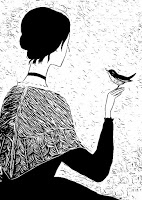 |
| FEDERICO GARCÍA LORCA |
Returning to the ravine of death
Claude Couffon was the first historian to investigate Lorca's 1936 execution
CLAUDE COUFFON
Granada, 16 de junio de 2011
Around six men made up the death squad. Dawn had not broken yet, and the headlights of a car lit up the Víznar ravine. A priest administered the last rites to the prisoners about to be executed. That is how the poet and playwright Federico García Lorca died, together with three other men, on August 19, 1936, at the onset of the Spanish Civil War.
Claude Couffon, the French Hispanist and renowned Lorca researcher, was the first person who had the guts, or the nerve, to travel to post-war Spain and ask what had happened to the poet. "At age 22 I was pretty daring. Nobody in Granada wanted to talk about what had happened. It was dangerous to ask questions and it was impossible to enter Víznar," recalls Couffon, now 86, about his visit to the Andalusian city in 1948, just 12 years after the writer's assassination by a Nationalist death squad.
"At age 22 I was pretty daring. Nobody in Granada wanted to talk"
So why did the young man lie to Ian Gibson about having buried the poet? "
Nobody in either Víznar had ever seen or heard about the poet at that time"
But Couffon returned to Granada with the Franco dictatorship fully consolidated in 1949 and decided not to leave again until he had some answers.
"That time I met the right people. I made friends in the city and one of them was from Víznar, so I was able to enter the village," he says, standing at Granada's city limits in what is possibly his "last visit "here.
The Frenchman, born in Caen in 1926, has decided to return to the scene of the crime with a journalist from EL PAÍS to talk about his own vision of what happened on August 19, 1936 and to appraise what has been said and written about it since.
"Things are very different today. There used to be a police checkpoint right here. They kept tabs on everyone's movements in the area. Only the villagers could go in," he says. The Couffon of today complains of pain in his legs and he walks with difficulty, but his mind remains agile like that of the young man who once followed the trail of Lorca. He proudly recalls that he was the first person to reveal the dramatist's exact birth date.
 |
| Claude Couffon and his wife in the ravine at Víznar, where he says Lorca is buried. |
"In an interview he'd said that he was born in 1899, maybe to appear a year younger, but I think he did it so he wouldn't seem so much like part of the Generation of '98." Lorca himself espoused the more modern Generation of '27 literary group which included poets such as Rafael Alberti and Nobel laureate Vicente Aleixandre.
For decades, Couffon has been living in a tranquil corner of Normandy and stopped working on the subject of Lorca for a simple reason. "I had access to the right people. As far as I was concerned, the case was closed. Once I published my first conclusions, there was so much speculation. Everyone had a different version of events. There were many legends and many lies."
The researcher says he followed the story of the 2009 search for his grave, which was unsuccessful. "Of course I knew about the search, but nobody asked me where to dig," he says. "I always knew they would not find him there. That made no sense. They were very far away."
Couffon believes that Ian Gibson, the other great living Hispanist and Lorca researcher, was wrong to have believed the testimony "of a boy who could not possibly have buried García Lorca, and if he had he would not have recognized him." How could the young Manolillo el comunista, who had never been outside his native village of Alfacar, remember having buried Lorca at night?
"It's impossible for many reasons, but essentially because nobody in either Víznar or Alfacar had ever seen or heard about the poet," the French historian states. So why did the young man lie to Gibson when the latter visited the area on his own research? "Only he would know that."
"At first the graves were not deep. I was able to see them and even touch them," Couffon continues. "There were about 20 of them. Federico was not in the central grave. He was in a smaller one, possibly in that area [he points at the entrance to the ravine]. It was a steep place, all rocks and no trees. Today it's full of pine trees. Did nobody think of that?"
"There were no trees, not so much as a flower. There were open wells and the graveyard. The graves were small mounds of reddish earth," he continues.
A few months after Couffon's photographs of the area appeared in print, the Franco regime had the area planted with pines, which grow very fast. "At the bottom of the wells, the bodies ended up decomposing and sank underground," he wrote in his book. Couffon takes his leave from this place with no signs of melancholy. "It is easy to leave this behind - it represents all of human evil."
















%2B(1).jpg)





